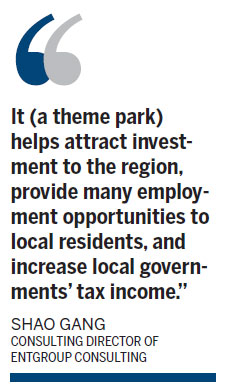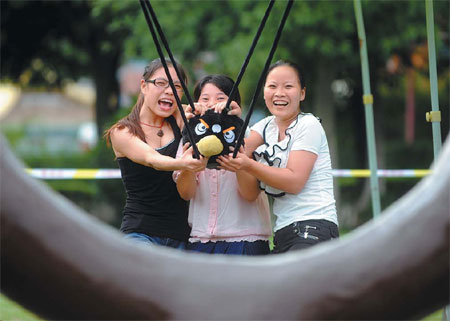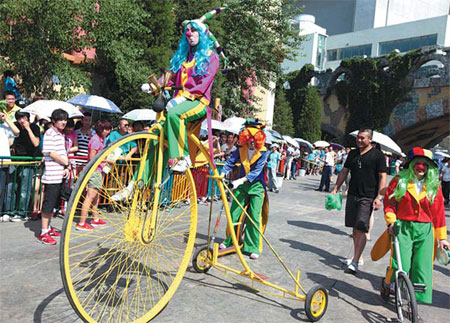OCT Group finds formula for success
Updated: 2013-04-04 08:11
By Huang Ying (China Daily)
|
||||||||
|
Tourists play a real-life version of the video game Angry Birds at the Window of the World amusement park in Changsha, Hunan province. Di Lu / for China Daily |
|
Clowns from the Shenzhen Happy Valley amusement park pose for photos with a foreign tourist at a carnival in Chengmai, Hainan province. Yin Enbiao / for China Daily |
|
Performers ride giant tricycles at the Happy Valley amusement park in Beijing. Da Wei / for China Daily |

As many theme parks struggle, a State-owned enterprise has flourished. Huang Ying examines the reasons behind the company's rapid growth.
Theme parks may seem to be a good choice for property tycoons and eager speculators in the current economic environment, as the government continues to tighten controls on the real estate market and boosts the development of the culture industry. However, the fact is that among the theme parks now operating in the Chinese mainland, only a fraction of them make a profit, analysts say.
Overseas Chinese Town Group is one of the few that dedicates itself to the culture industry among State-owned enterprises. Under the management of the State-owned Assets Supervision and Administration Commission, OCT Group has established a well-organized layout for theme parks across the country over the past two decades.
The tourism and culture giant's first theme park, Splendid China, opened in Shenzhen, Guangdong province, in 1989.
OCT Group developed some other projects that can be categorized into three types. One kind is amusement parks, entertaining people and offering recreation services, while another offers resorts, combining leisure activities and scenic spots for tourists. The third type comprises miniaturized scenic spots.
The Happy Valley parks belong to the first group. They have gained in popularity since the first one opened in Shenzhen in 1998.
OCT Group now operates five Happy Valleys across the nation, making it the first domestic theme-park chain brand. The other four are in Beijing; Chengdu, Sichuan province; Shanghai; and Wuhan, Hubei province. The sixth one in Tianjin is scheduled to open within this year.
In the second category are OCT East, in Shenzhen, and OCT Taizhou, in Jiangsu province. Another project of this kind is under construction in Kunming, capital of Yunnan province, and is scheduled to be completed this year, according to the company.
Window of the World parks in Shenzhen and Changsha, Central China's Hunan province, with miniature models of top international tourist attractions, belong to the third kind.
OCT Group made the list of top 10 amusement park chains worldwide for the first time in 2008, ranking eighth with an attendance of 13.4 million. The group kept its ranking in the list in the following three years, according to the Global Attractions Attendance Report released by the Themed Entertainment Association and the Economics practice at AECOM.
In 2011, of the top 20 amusement or theme parks in Asia as measured by attendance, nine are in the Chinese mainland, and five are owned by OCT Group, the report said.
The company earned 6.3 billion yuan ($1 billion) from its tourism and cultural sectors in 2011, and the figure surged to 10.5 billion yuan last year, registering a year-on-year increase of 66.7 percent, according to its financial report.
Its success in the theme park sector lies in its business model and its identity as a State-owned enterprise, analysts said.
Unlike other theme park developers, OCT Group excels in developing property and hotel business in the surrounding areas of its theme parks, as it is also a leading property and hotel developer nationwide in addition to its culture and tourism business.
"You can see that in the vicinity of almost every Happy Valley park, there will be a City Inn hotel, an economy-hotel chain brand owned by the OCT Group," said Yang Yanfeng, an associate professor at the China Tourism Academy.
Shao Gang, consulting director of EntGroup Consulting, a Beijing-based entertainment industry consultancy, said: "Generally speaking, for a mature and profitable theme park, the ticket sales take up about 30 percent of the total revenue, while the rest come from surrounding hotels, restaurants and other derivative products."
As a State-owned conglomerate, OCT Group has easy access to parcels of land conducive to commercial development because local governments are wooing State-owned companies' investments.
Local governments prefer investment projects initiated by State-owned enterprises over those by private counterparts, because the SOEs are financially stronger than private peers and they perform more cautiously on the projects, which gives local officials more confidence about the prospects of those projects, Yang said.
"Sometimes local authorities even change their regional development plan so as to cater to the State-owned enterprises' demands in investment," he said.
Regional governments also benefit from its theme parks because a theme park brings much more than the entertainment experience alone.
"It helps attract investment to the region, provide many employment opportunities to local residents, and increase local governments' tax income," Shao said.
"That's why the strategic investment department of OCT Group is always overwhelmed by the investment invitations from quite a number of local governments," Shao added.
The number of visitors to OCT parks increased from 15.8 million in 2009 to 21.73 million in 2011, according to the TEA report. US-based Walt Disney Parks and Resorts ranked first in the list of top 10 theme park chains worldwide by reaching attendance of 121.4 million in 2011.
However, OCT parks also face growing challenges from their competitors in China.
US leading entertainment company Walt Disney Co has expanded its well-known theme park brand to China. As the world's sixth Disney amusement park and the first in the Chinese mainland, the 24.5-billion-yuan Shanghai Disneyland Park is now under construction and scheduled to open in 2015.
"Shanghai Disneyland Park will attract a significant number of visitors from other theme-park productions in eastern China, including OCT Group's Happy Valley park in Shanghai in the middle and short run, but the effect will gradually weaken in the long term because visitors have diverse demands for theme-park productions," Yang said.
Movie-themed parks have emerged with the boom of China's film industry in recent years. Huayi Brothers Media Corp, one of China's largest movie production companies, entered the field in 2011, when it announced its first movie-themed park project in Suzhou, Jiangsu province, in cooperation with other partners.
One year later, it co-invested in a movie-themed commercial zone in Haikou, Hainan province. The zone will feature streets and blocks that once appeared in Huayi Brothers' movie productions.
Hong Kong director-actor Stephen Chow in February announced the plan to build a Journey to the West Film Art Center project in Wuzhen, East China's Zhejiang province, after the namesake film series became popular nationwide. The latest episode of the series, Journey to the West: Conquering the Demons, has raked in more than 1.23 billion yuan in box office receipts to date, making it the third highest-grossing film in the Chinese mainland in history.
"The difference between amusement-oriented theme parks and movie-themed parks is that the latter is required to be well-recognized among the public through movies or novels themselves," said Shao.
"But at present I don't think there is any film series in the country that can support the establishment of a theme park," he added. "Because it really asks for considerable details of a movie to afford the sustainable development of a movie-themed park, for example, the Harry Potter attraction in Islands of Adventure at Universal Orlando Resort in the US state of Florida."
Contact the writer at huangying@chinadaily.com.cn
(China Daily 04/04/2013 page7)

 In Photos: 7.0-magnitude quake hits Sichuan
In Photos: 7.0-magnitude quake hits Sichuan
 Li Na on Time cover, makes influential 100 list
Li Na on Time cover, makes influential 100 list
 FBI releases photos of 2 Boston bombings suspects
FBI releases photos of 2 Boston bombings suspects
 World's wackiest hairstyles
World's wackiest hairstyles
 Sandstorms strike Northwest China
Sandstorms strike Northwest China
 Never-seen photos of Madonna on display
Never-seen photos of Madonna on display
 H7N9 outbreak linked to waterfowl migration
H7N9 outbreak linked to waterfowl migration
 Dozens feared dead in Texas plant blast
Dozens feared dead in Texas plant blast
Most Viewed
Editor's Picks

|

|

|

|

|

|
Today's Top News
Live report: 7.0-magnitude quake hits Sichuan, heavy casualties feared
Boston suspect cornered on boat
Cross-talk artist helps to spread the word
'Green' awareness levels drop in Beijing
Palace Museum spruces up
First couple on Time's list of most influential
H7N9 flu transmission studied
Trading channels 'need to broaden'
US Weekly

|

|










